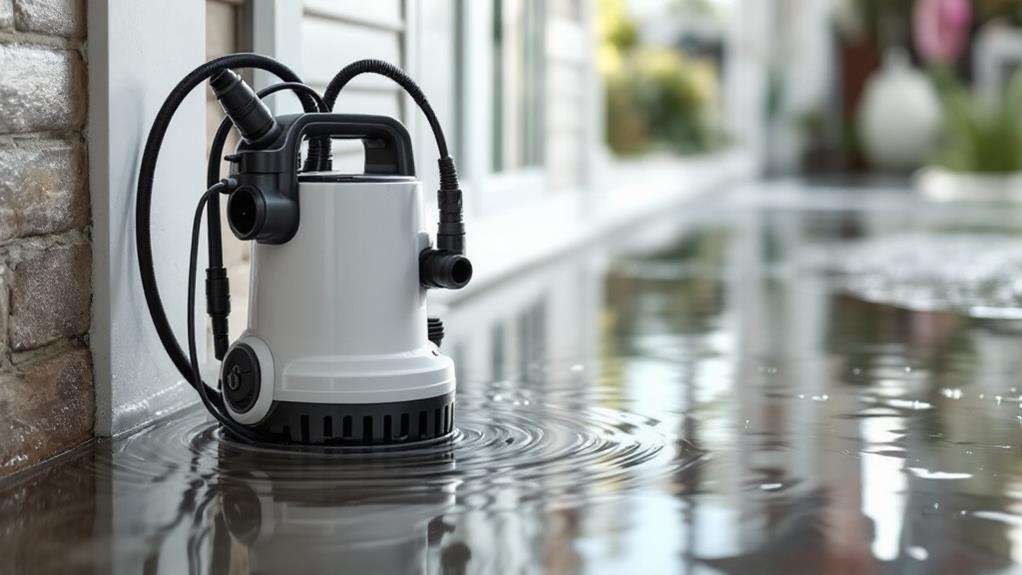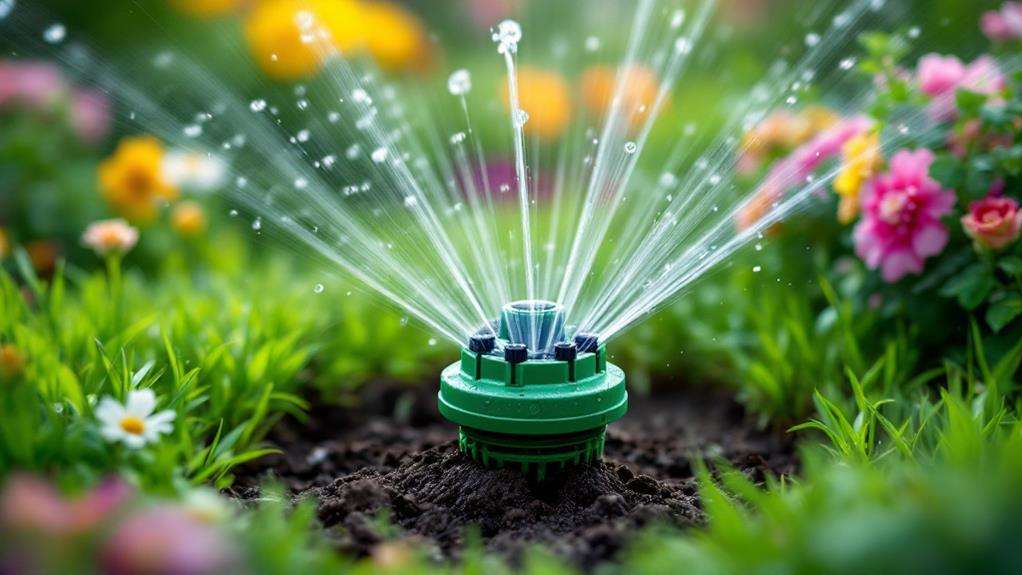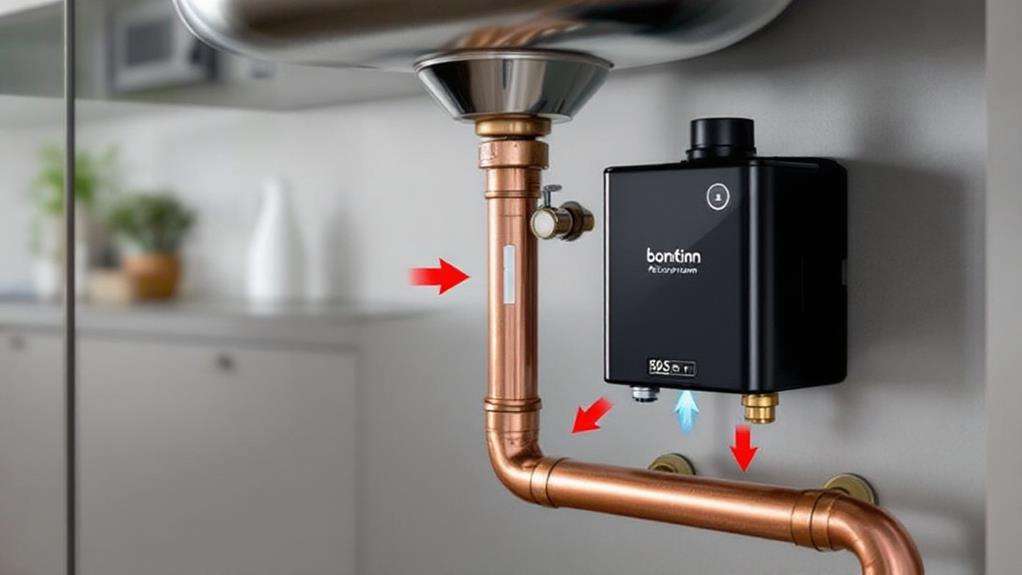Understanding Different Types of Pumps for Home Plumbing Systems
Your home's plumbing system relies on various pumps to function effectively. Sump pumps protect your foundation from water damage, while sewage pumps manage waste removal. Utility pumps handle diverse tasks, from light aquarium use to heavy-duty dewatering. Well pumps extract water from underground sources, and lawn sprinkler pumps power your irrigation system. Pool and pond pumps circulate water in recreational features, and hot water recirculation pumps provide instant hot water throughout your home. Each pump type serves a specific purpose, ensuring your plumbing operates smoothly. Understanding these different pumps will help you maintain a well-functioning and efficient home plumbing system.
Sump Pumps for Foundation Protection
In order to protect your home's foundation from water damage, sump pumps play an essential role. These submersible pumps are installed in a basin around your home's foundation, working tirelessly to remove water that collects and prevent flooding. As part of your home plumbing system, sump pumps are designed to handle not just water, but also debris like leaves, twigs, and sludge.
You'll typically find sump pumps in basements or other below-grade areas of your home. They're powered by either manual or semi-automatic motors, providing efficient water removal to maintain a dry foundation. Sump pumps are critical for dewatering applications, pumping excess water from the basin to your main sewer line or drainage system.
These devices are particularly irreplaceable in areas with high groundwater levels or during heavy rains. By constantly monitoring and removing water, sump pumps help safeguard your home's structural integrity. They're an indispensable component of foundation protection, working silently to prevent costly water damage. When properly installed and maintained, sump pumps ascertain your home remains dry and secure, even in challenging weather conditions.
Sewage Pumps for Waste Management
While sump pumps protect your foundation, sewage pumps tackle another pivotal aspect of your home's plumbing system: waste management. These powerful devices are designed to handle liquids and semi-solids, efficiently transporting wastewater from a sewage basin to the main sewer line. You'll typically find them in basements or other below-grade areas, making certain that waste is properly removed from your home.
Sewage pumps are particularly useful if you have below-grade living spaces or reside in flood-prone areas. They're engineered to handle debris like leaves, twigs, and sludge, making them ideal for dewatering applications during flooding events. When selecting a sewage pump, consider its capacity and horsepower, which should be based on the volume of wastewater and vertical lift required to move the fluid out of your property.
To keep your waste management system running smoothly, it is imperative to maintain your sewage pump regularly. This includes occasional replacement to prevent backups and ensure reliable operation. By properly caring for your sewage pump, you'll safeguard your home against potential plumbing disasters and maintain a healthy living environment.
Utility Pumps for Versatile Applications

After addressing specific pump types, it's time to investigate the jack-of-all-trades in the pump world: utility pumps. These versatile water pumps are designed to handle a wide range of applications, from light aquarium use to heavy-duty dewatering tasks. You'll find utility pumps useful for various situations around your home and garden.
Transfer pumps, a type of utility pump, can move water from one location to another, such as from a well to a storage tank. If you're dealing with low water pressure, augmenting pumps can increase it for car washing or lawn sprinkling. Water garden pumps are essential for maintaining healthy plants by providing a steady water supply for irrigation and water features.
One of the key advantages of utility pumps is their ability to handle light debris and contaminants, making them suitable for diverse water-related tasks. Whether you need to move water at a specific rate in gallons per minute or maintain a consistent water flow, there's likely a utility pump that fits your needs. From well pumps to general-purpose water pumps, these devices offer the flexibility to tackle various plumbing challenges in and around your home.
Well Pumps for Water Extraction
Well pumps are the lifeblood of water systems for homes without access to municipal supplies. These essential devices extract water from underground sources, bringing it to the surface for your household needs. The type of pump you'll need depends on your well's depth and your property's water requirements.
For shallow wells up to 25 feet deep, you'll want a shallow well pump. These pumps require a one-way check valve to stay primed. If your well is between 25 and 110 feet deep, a deep well jet pump is your best option. These pumps need a foot valve to prime the system efficiently.
For wells ranging from 25 to 400 feet deep, submersible well pumps are the go-to choice. These pumps are installed directly in the well casing, which means they must be pulled out for any maintenance or repairs.
When selecting a well pump, consider the depth of your well and your water extraction needs. Each type of pump has its advantages and limitations, so it's important to choose the right one for your specific situation. By understanding these differences, you'll ascertain a reliable water supply for your home.
Lawn Sprinkler Pumps

Moving from well water extraction to lawn care, let's investigate lawn sprinkler pumps. These essential devices draw water from external sources like wells or municipal supplies to power your home's sprinkler system. They're designed to provide the necessary water pressure and flow rate to effectively water your lawn, garden, and landscaping.
Lawn sprinkler pumps are typically powered by electricity and come in two main configurations: above-ground and submersible models. When selecting a pump for your sprinkler system, you'll need to consider the size of your lawn and the system's requirements. Larger areas demand higher flow rates, so it's pivotal to choose a pump that can handle your specific needs.
Proper pump selection and installation are indispensable for ensuring efficient and reliable operation of your sprinkler system. You'll want to ponder factors such as the pump's power, pressure capabilities, and flow rate when making your decision. By choosing the right lawn sprinkler pump, you'll be able to maintain a lush, well-watered scene while optimizing your water usage and energy consumption.
Pool and Pond Pumps
Nearly every outdoor water feature relies on pool and pond pumps to maintain water quality and aesthetics. These pumps are essential for circulating and filtering water in swimming pools, as well as powering various water features in decorative ponds and gardens.
There are different Types of pool and pond pumps, each designed for specific applications. Pool pumps are primarily used to move large volumes of water through filtration systems, guaranteeing that your pool remains clean and safe for swimming. They're a pivotal component in maintaining proper chemical balance and preventing algae growth.
Pond and water garden pumps, on the other hand, are often used to create beautiful water features like fountains, waterfalls, and cascades. These pumps move fluid in a way that enhances the visual appeal of your outdoor space while also promoting healthy water circulation for aquatic plants and fish.
When choosing a pump for your pool or pond, it's important to ponder the specific use and requirements of your water feature. The right Type of pump will ensure efficient water movement, proper filtration, and ideal performance for your outdoor oasis.
Hot Water Recirculation Pumps

In the domain of home plumbing systems, hot water recirculation pumps have become increasingly popular for their ability to provide instant hot water throughout a house. These pumps are typically connected to your water heater and continuously circulate hot water through a dedicated return line. This guarantees that water pressure remains consistent and hot water is readily available at every faucet and shower.
Unlike other pumps that remove water from one area or add water to another, hot water recirculation pumps simply keep water moving. They don't need to prime, as they're always filled with water. The pump doesn't need to overcome significant pressure differences; it just maintains a steady flow.
You'll find these pumps particularly useful in larger homes where the distance between the water heater and faucets is considerable. By using a recirculation pump, you won't have to wait for hot water any longer, saving thousands of gallons annually. You can activate the pump manually or set it on a timer for specific times. This efficiency not only conserves water but also reduces the energy required to heat water, making your home more environmentally friendly and cost-effective.
Choosing the Right Pump
When it comes to selecting the appropriate pump for your home plumbing system, you'll need to ponder several key factors. Pumps are often used for various purposes, and understanding different types of pumps is indispensable for making the right choice.
First, consider the pump's capacity, measured in gallons per minute or hour, to satisfy it meets your needs. The required power, expressed in horsepower, is another essential aspect. You'll also want to examine the materials used, such as sheet metal, cast iron, or stainless steel, as they affect durability and performance.
Different types of pumps are designed for specific applications. Transfer pumps move water from one place to another, while effluent pumps pump liquids containing solids. Sump pumps protect home foundations, and trash pumps handle dewatering with debris. The type of positive displacement pump you choose depends on your particular requirements.
Consider the power source, which can be gasoline, electricity, natural gas, or diesel. Don't forget to evaluate the head pressure, which describes the vertical lift and pump limitations. By carefully assessing these factors, you'll be able to select the most suitable pump for your home plumbing system.
